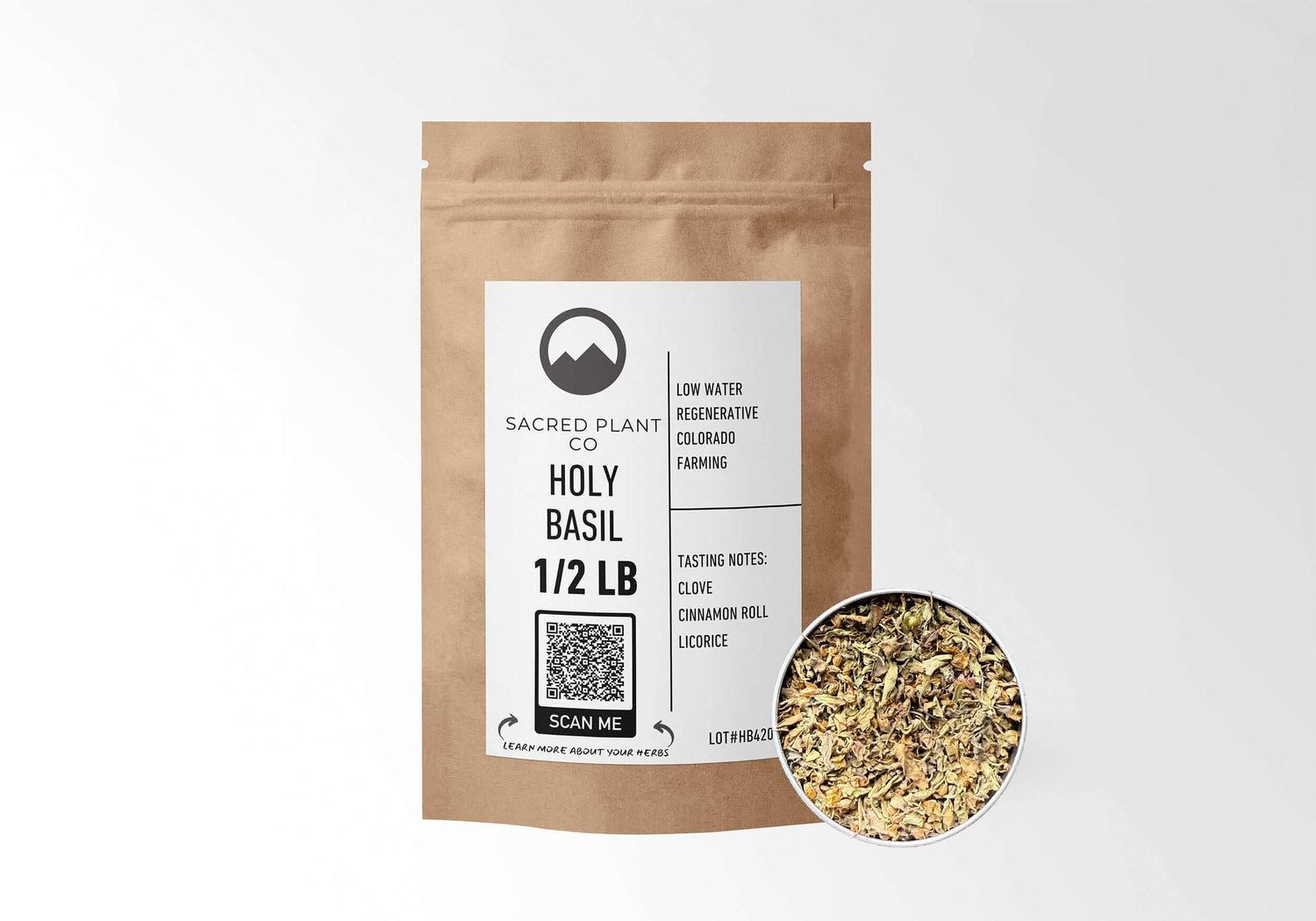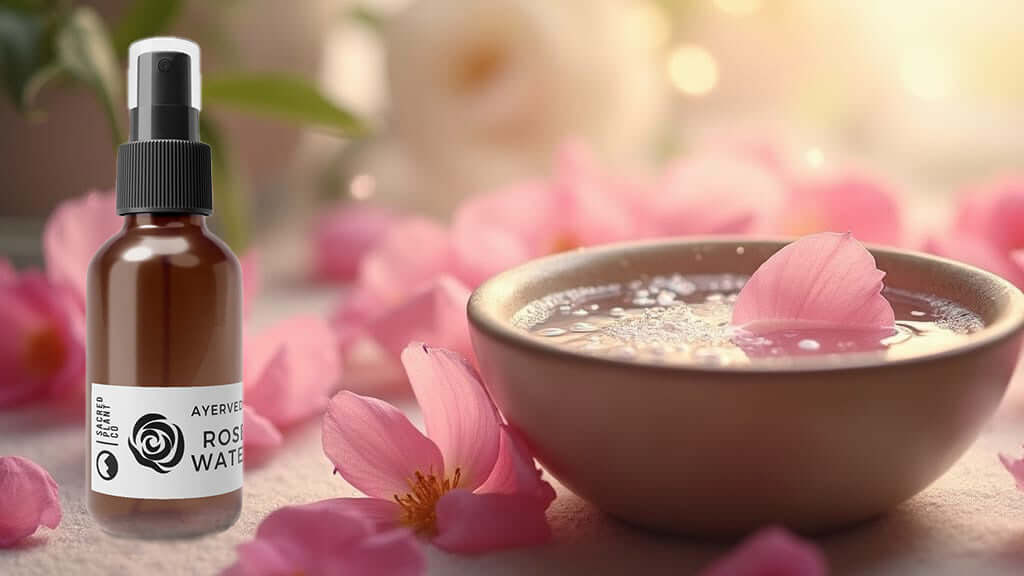Brew Tulsi Tea: Step‑by‑Step for Maximum Flavor & Benefits

Tulsi, also called Holy Basil (Ocimum tenuiflorum), holds a place of profound honor in Ayurvedic tradition. For thousands of years, it has been cherished as more than an herb. It is seen as a plant ally, a spiritual guardian, and a living symbol of vitality and protection.
Across India, Tulsi is grown not just in gardens but in courtyards, temples, and homes, where it is watered daily, spoken to, and honored with devotion. These traditions reflect something modern herbalists are now rediscovering. Tulsi has an extraordinary ability to help the body adapt to stress, support the nervous system, clear the mind, and restore balance.
Yet the power of Tulsi is not unlocked through casual use. The way you brew it matters. Temperature, time, and intention all shape what this sacred plant offers you. When handled with care, Tulsi creates a tea that is vibrant and complex—fragrant with clove, basil, and earth—each cup alive with compounds that support health and calm the spirit.
In this guide, you will learn exactly how to brew Tulsi tea to preserve its flavor, protect its delicate compounds, and align with the traditions that have kept this herb sacred for centuries.
Water Temperature and Steep Time: Unlocking Tulsi’s Full Potential

Brewing Tulsi tea isn’t just about soaking leaves in hot water. It’s a delicate act of extraction, where temperature and time determine what you draw out of the plant. Tulsi contains a complex array of volatile oils, polyphenols, flavonoids, and adaptogenic compounds. If the water is too cool, you miss the full spectrum of its chemistry. If it's too hot, you risk degrading some of its most aromatic and therapeutic elements.
Ideal Water Temperature: 190 to 205°F (88 to 96°C)
Aim for just below a full boil. This range is hot enough to extract Tulsi’s essential oils—like eugenol, rosmarinic acid, and linalool—without scorching them. These compounds are responsible not only for Tulsi’s signature aroma (a warming blend of clove, basil, and mint) but also for many of its calming and anti-inflammatory effects.
If you don’t have a thermometer, watch for small bubbles forming on the bottom of the kettle. Once steam begins to rise steadily and the water gently simmers without a rolling boil, it's ready.
Steep Time: 7 to 10 Minutes, Covered
Tulsi needs time to open. A quick dip won’t release its deeper qualities. Steep the herb for at least 7 minutes, up to 10 if you want a richer, fuller body. The key is covering your vessel while the tea steeps. This prevents the evaporation of the delicate volatile oils that carry both aroma and therapeutic potency.
In Ayurvedic thought, these oils are seen as the prana or life-force of the plant—fugitive, fragile, and vital. Keeping them in your cup, not in the air, is the difference between a flat brew and a soul-satisfying one.
Dosage: How Much Tulsi to Use
Use 1 heaping teaspoon of dried Tulsi leaves per 8 ounces of water. If you’re making a stronger infusion for therapeutic use, you can increase to 1.5 teaspoons. Always use Tulsi that has been grown, harvested, and dried with care, as exposure to heat or improper drying can destroy its subtle properties.
If you’re using Sacred Plant Co’s regeneratively grown Tulsi, you’re working with leaf that was hand-harvested at peak vitality, then dried in small batches to preserve its full spectrum of actives.
Flavor Variations: Customizing Tulsi to Fit Your Body and Season
One of the beautiful gifts of Tulsi is its versatility. On its own, it offers a warm, slightly spicy, and uplifting brew with notes of clove, cinnamon, and a faint trace of licorice. But Tulsi also serves as a harmonious base for blending, adapting easily to your personal needs, body type, or the changing of the seasons.
Understanding which herbs pair well with Tulsi allows you to create teas that are not only flavorful but also more targeted in their effects. In traditional herbalism, combinations are chosen intentionally—never randomly. Every herb you add brings its own properties, energetics, and relationship to Tulsi.
For Calm and Clarity
Blend Tulsi with Lemon Balm, Chamomile, or Skullcap
These nervine herbs amplify Tulsi’s stress-soothing properties. The result is a deeply calming tea that quiets looping thoughts and relaxes muscle tension without making you groggy. Perfect in the evening or anytime anxiety begins to rise.
For Immune and Respiratory Support
Add Ginger, Licorice Root, Mullein, or Peppermint
This blend opens the lungs and warms the digestion. Tulsi and ginger together support circulation and immunity, while licorice and mullein coat and soothe inflamed tissue. Peppermint lightens the brew with menthol freshness.
For Morning Energy and Mental Focus
Pair with Gotu Kola or Rosemary
These cognitive tonics enhance clarity and mental stamina. Gotu kola is revered in Ayurveda for sharpening the mind, while rosemary brings blood flow to the brain and awakens the senses. Tulsi anchors the blend with adaptogenic steadiness.
For Women's Wellness
Combine with Raspberry Leaf or Shatavari
Both of these herbs have a long tradition of supporting hormonal balance and reproductive health. Raspberry leaf is mineral-rich and toning, while shatavari adds cooling, nourishing qualities. Tulsi helps the body regulate stress, which is foundational for hormonal harmony.
Health Benefits of Tulsi: The Sacred Adaptogen

Tulsi has earned its place as one of the most important herbs in Ayurvedic medicine not just because of its history, but because of what it does. It is considered a rasayana—a rejuvenating tonic that supports longevity, resilience, and clarity. In modern herbalism, Tulsi is classified as an adaptogen, meaning it helps the body adapt to stress, both physical and emotional, without overstimulation or sedation.
Stress Response and Emotional Balance
Tulsi has a unique ability to modulate cortisol levels and support the nervous system’s return to baseline after stress. Unlike caffeine or sedatives, Tulsi doesn’t push the body in one direction. It brings balance. This makes it a powerful ally for those navigating anxiety, burnout, insomnia, or emotional fatigue.
Its aromatic oils—especially eugenol, linalool, and caryophyllene—have documented calming and anti-inflammatory effects on the central nervous system. A well-brewed cup of Tulsi can ease tension, deepen breath, and shift your inner state within minutes.
Immune Support and Inflammation
Traditionally used for colds, flus, and fevers, Tulsi has been shown in modern studies to possess antibacterial, antiviral, and antifungal properties. It supports immune resilience without overactivation, making it suitable for long-term use.
Its antioxidant profile is rich in flavonoids and phenolic compounds, helping to reduce systemic inflammation. In Ayurvedic terms, Tulsi is said to "kindle the digestive fire" and cleanse the ama—a concept describing toxins or undigested waste that accumulates in the body.
Respiratory Clarity and Circulatory Support
Tulsi is often used in Ayurvedic formulations to open the lungs, ease cough, and support clear breathing. It acts as a gentle bronchodilator and expectorant, helping the body clear mucus while soothing irritated airways. Its warming nature also supports healthy circulation, particularly when combined with herbs like ginger or cinnamon.
Cognitive and Energetic Resilience
Tulsi sharpens awareness while grounding the mind. For those feeling scattered or overstimulated, it brings a kind of centered alertness—calm but awake. In energetic herbalism, it is said to “lift the heart” and “clear the subtle channels,” making it a valuable herb not just for the body, but for the emotional and spiritual self.
For a broader understanding of how Tulsi fits into the family of adaptogens and why adaptogenic herbs are so essential in the modern world, read our companion article:
👉 Adaptogens Demystified
Brewing Tulsi as an Act of Care
Tulsi is more than an herb. It is a daily companion in resilience, clarity, and calm—a sacred plant that meets you exactly where you are and helps you return to center.
When you brew it with care, you engage in more than a recipe. You participate in a living lineage of herbal wisdom. Every step—selecting the water, steeping with intention, blending with purpose—becomes part of a healing conversation between you and the plant.
At Sacred Plant Co, our Tulsi is grown using regenerative, Korean Natural Farming techniques, harvested by hand at peak potency, and dried with precision to preserve every compound and every story this plant carries. It is our honor to offer you not just the herb, but the connection it represents.
Explore our Tulsi offerings, and let your next cup be more than a beverage. Let it be a ritual, a moment of wisdom, and a return to what matters.






